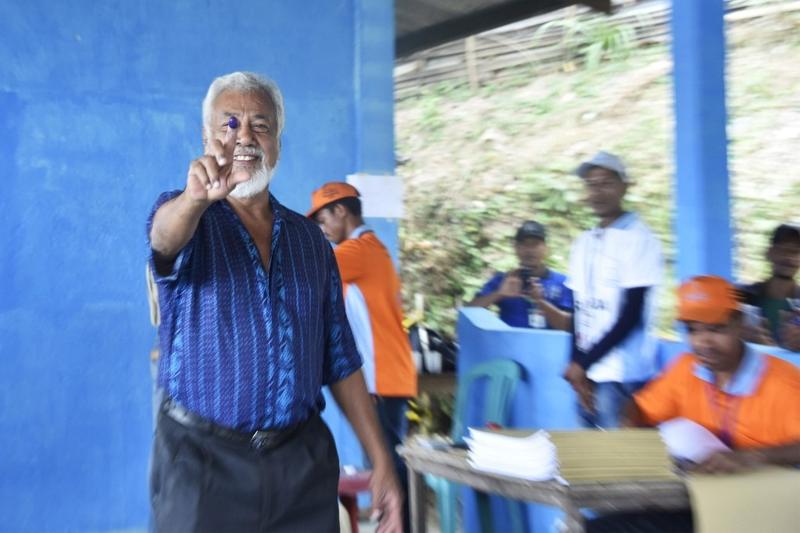 In this May 12, 2018 file photo, East Timor's former president and independence hero Xanana Gusmao (left) shows his marked finger after casting his ballot during the general election in Dili. (VALENTINO DARIELL DE SOUSA / AFP)
In this May 12, 2018 file photo, East Timor's former president and independence hero Xanana Gusmao (left) shows his marked finger after casting his ballot during the general election in Dili. (VALENTINO DARIELL DE SOUSA / AFP)
DILI — A six-party coalition in East Timor is ready to form a government led by independence hero Xanana Gusmao, it has told President Francisco Guterres in a letter, the coalition’s spokesman said on Tuesday.
This coalition must offer itself as an alternative to ending political impasse
Antonio da Conceicao, the coalition’s spokesman
Gusmao, 73, the first president and a former prime minister, last month announced he had formed a new coalition controlling 34 of parliament’s 65 seats and said he would prepare to form a new government.
“This coalition must offer itself as an alternative to ending political impasse,” as its goal, the spokesman, Antonio da Conceicao, told reporters.
The tiny Southeast Asian nation has faced a new round of political instability since the collapse of a coalition supporting Prime Minister Taur Matan Ruak, who goes by a popular name rather than his birthname of Jose Maria de Vasconcelos.
The prime minister resigned last month, having repeatedly failed to pass a budget for 2020 after the largest party in his coalition, the National Congress for Timorese Reconstruction (CNRT) party of Gusmao, withdrew support.
He had been backed by a three-party coalition, the Alliance of Change for Progress (AMP).
But there has been periodic political deadlock and growing tension after Guterres, who belongs to the opposition Fretilin party, rejected some ministers proposed by Gusmao, over accusations of graft.
ALSO READ: East Timor PM resigns after political coalition collapses
Da Conceicao said the decision to install Gusmao, who held the post from 2007 to 2015, was up to Guterres.
Gusmao was at the forefront of efforts to end Indonesian rule after Jakarta annexed the territory in 1976 and was imprisoned during the rule of former Indonesian President Suharto.
Indonesia agreed to a referendum in 1999 which resulted in a violence-plagued vote for independence in the former Portuguese colony, before it became an independent state in 2002.
Asia’s youngest democracy has been beset by political instability in recent years, hampering efforts to reduce poverty, stamp out corruption and develop its rich oil and gas resources.
READ MORE: Australian Parliament approves treaty with East Timor
The energy sector contributed about 60 percent of gross domestic product in 2014 and more than 90 percent of government revenue.


